After twenty-five years, I still hear the phrase, "You're not Asian enough", loosely thrown around by Asians and non-Asians alike, as if the phrase has become ingrained into English vernacular. Hidden behind a cultural backdrop of the countless sacrifices our immigrant parents and our grandparents made, the bottled-up pressures to succeed academically and professionally contribute to the socially vibrant caricature of Asians as America's "model minority". Maybe this was why the crowd at The Apollo Theater, the historical and world-famous venue in Harlem where African American greats like Stevie Wonder, Lauryn Hill and Jimi Hendrix made their names, remained quietly perplexed: as Sung Lee— skinny, Asian and wearing full-framed glasses— made his way onto the stage, many did not know what to expect. s
As he walked onto the stage gripping a microphone, Sung quickly looked at the expansive seating arena that sat 1,500 people and slightly shuffled his hands. He raised his left hand motioning the beginning of his piece and hummed a trance-like percussion melody, hardly receiving any response from the crowd.
Seconds later, he smoothly took a half-step back, quickly elevating the frame of his glasses with his finger. In one swoop, he instantly switched levels, pointed to the crowd to "listen" and exploded into a rapid-fire amalgam of drum-machine mimicry using only his mouth, tongue, lips and voice.
The once silent theater was instantly dominated by an eruption of applause, which reverberated from the upper mezzanine to the main floor. The shocked audience, now on their feet, stood to cheer him on.
When Sung was in his early teens, he was part of a niche audience entirely mesmerized by beatboxers such as Doug E. Fresh and Rahzel, to name a few. After discovering beatboxing through a video on the Internet, he was so impressed that he immediately began to learn the fundamentals of the craft. The more he practiced, the more he fell in love with the art.
Then the time came when most students in Bergen County received their high school diplomas and excitedly matriculated to their chosen colleges; Sung, on the other hand, explained he went to college to satisfy his parents.
" They didn’t see a career as a beatboxer. It's like my son is making silly sounds with his mouth and he wants to do that for a living."
At an early age without extensive life experiences, the middle ground between dreams and reality is truly a challenging place to stand.
Instead of pursuing his passion, he spent his time studying psychology. In 2014, USA Today College reported that psychology was the second most popular major for university students; Rutgers University reported that psychology was the most popular major and minor in its own School of Arts and Sciences. Unable to pursue his dream, Sung majored in psychology while drifting into daydreams— energetically beatboxing under the stage's fluorescent LED lights to a zealous and rowdy crowd, bumping their hands in the air—then forcefully drifting back to reality where his professor taught complex concepts in the old-fashioned, soporific lecture hall.
After graduating from college, a Psychology degree under his belt, Sung secured a 9-5 job. Ironically Sung worked in the very city where recent graduates flock to by taking their first paid-time off (PTO) days as new hires: Las Vegas. Even within the boisterous setting, his line of work failed to satisfy him— as a creative person, the job simply didn't suit him.
One day when he received a break from his routine occupational responsibilities, Sung found himself watching YouTube clips of up-and-coming beatboxers. These clips presented a very personal yet justifiable question in his heart—"why can't that be me?"— as if his journey rounded out full-circle from the very day, a decade ago, when he watched his first beatboxing video. After watching that first beatboxing video, pursuing beatboxing seriously even when many friends doubted him, beatboxing throughout high school and college, working a traditional 9-5 job and watching these beatboxing clips again, he told me, "it all sort of clicked."
In 2013, Sung actively took the first step towards making his dream a reality and quit his job, planning to start from rock-bottom by busking in New York City's subways every day.
Edit
Sung joined the many street-performers who publicly performed for the various professionals, students, waitresses, tourists, friends, parents and other inhabitants of New York City, a place that can reward the greatest of talent or pontificate modest, or less-than-stellar, talent. Music Times reported that 90.7% of music artists are unknown. This means that on average, only one of the ten street performers we pass by are known by the larger public. The same research found that only one out of five hundred performers makes it mainstream.
"Be honest with yourself and find out if you're good at it."
- Sung Lee
Sung chose to answer this question of, "Am I good enough?" by performing in the city's overcrowded subway stations, coupling his sophomoric microphone and loop-station with his blank slate and arousing curiosity within passengers who frequent the station. In much less than a minute, outspoken bystanders could become irritated, sourly yelling insults to the young dreamer who sacrificed plenty. Nonchalant pedestrians can pass him without ever acknowledging his existence, feigning a harmonization between his music and the screeching impediments by the adjacent subways. After identifying his passion, the only question left to answer was this personal question— "Am I good enough?"— in a process that vulnerably thrust him into the spotlight of one of the most public cities in the world.
In Union Square's subway station, he started to assemble his equipment. Once he finished, he began to recreate popular songs, such as Daft Punk's "Touch it"— dynamically dovetailing the song's electronic instrumental and foregrounded voice—using only his mouth.
"I kind of just suck it up. At end of the day, this is beatboxing. I have a lot of passion for this. This is what I do. Even if no one pays me for this, I’ll still do this... For me as a creative person, I’d much rather do music."
- Sung Lee
As he entered what he likes to call the "Grinding Phase," people began to notice. Granted, he was talented to begin with and his passion obsessively pushed him to work harder than the average person. However it is a different vibe when the crowd confirms your talent. It was almost like the universe tacitly nodded in approval telling him, "you were right all along."
Throughout the next year or two, Sung enjoyed performing at open mic nights for audiences of any age, inflicting culture shock to conservative middle-aged Korean men and women. He also collaborated with McDonald's and the rapper Hi-Rez for a surprise performance at a corporate office. Student organizations from Baruch, Rutgers, Stony Brook, NYU, Columbia and many other universities invited him to perform at their schools. He beat-boxed on a runway for Asian Fashion Week Extravaganza, traveled to Arizona for a performance and represented the USA in a renowned grand beatbox battle in Switzerland.
In addition, winning Kollaboration New York 9, a premier talent competition for Asian American artists where he performed alongside Asian American hip hop sensation and television personality Awkwafina, allowed him to advance to the largest Kollaboration event of the year: Kollaboration Star 2014. There, he competed against talented performers to eventually become crowned as the event's 2014 champion, bringing home a ten thousand dollar grand prize.
He even had the chance to perform for Solano State Prison's convicts. Seasoned men who had previously claimed that there were consequences to showing emotions in prison, nonetheless freely responded in a rare show of excitement as Sung created live music using his loop pedal.
His decision to pursue his dream opened the doors for many different and unique experiences— the majority, rewards that were bore by the risks he took— and he's an up-and-coming talent to be reckoned with. In fact, I wouldn't be surprised if younger teens, similar to him, watch his YouTube channel and start a similar journeys of their own.
"But you have to put the work in", he told me.
Not even a minute into his performance, Sung blasted into the then-popular song, "A Milli" by Lil Wayne, garnering more crazed responses from the audience. As if the audience's thirst for talent were not satisfied yet, he started rapping while beatboxing at the same time, efficiently combining the bass, snare, and lyrics altogether, without sacrificing the quality of the rap or the instrumentals in his solo performance.
Out of nowhere, he switched to electric music, introducing a deep and long base that could make house parties instantly turn up, but one that could have also shaken the cars of every rush-hour driver, uncomfortably waiting for the traffic light to turn green.
That night, the Apollo reported that Sung received the loudest standing ovation of the night with his solo-beatbox routine. CBS Sunday Morning covered how he won the notorious title— "Amateur Night: Super Top Dog"— and the ten thousand dollar grand prize that came with it; he was only invited to compete after consecutively winning prior "Amateur Night at the Apollo" competitions on May 14, May 28 and July 30 in the same year.
The cultural "glass ceiling" that was stacked against Sung shattered to the ground as the audience leaped to their feet in awe. The repetitive mashups practiced in the subway stations became a perfectly united symphony on this grand stage, accidentally breaking the cords of stereotypical and conventional modesty.
A couple weeks after the interview, he dropped a cover of The Chainsmoker's Closer and Twenty One Pilot's latest song Heathens, the latter using a Boss RC 505 Loop station. His environment was characterized by quotidian belongings yet it was one conducive to his creative and eclectic thoughts, agreeably churning his passionate dreams into reality one workday at a time.
Then he posted the video on his Facebook page and suggested viewers share the clip if they like— as if it were just another ordinary Monday at the Sungbeats office.

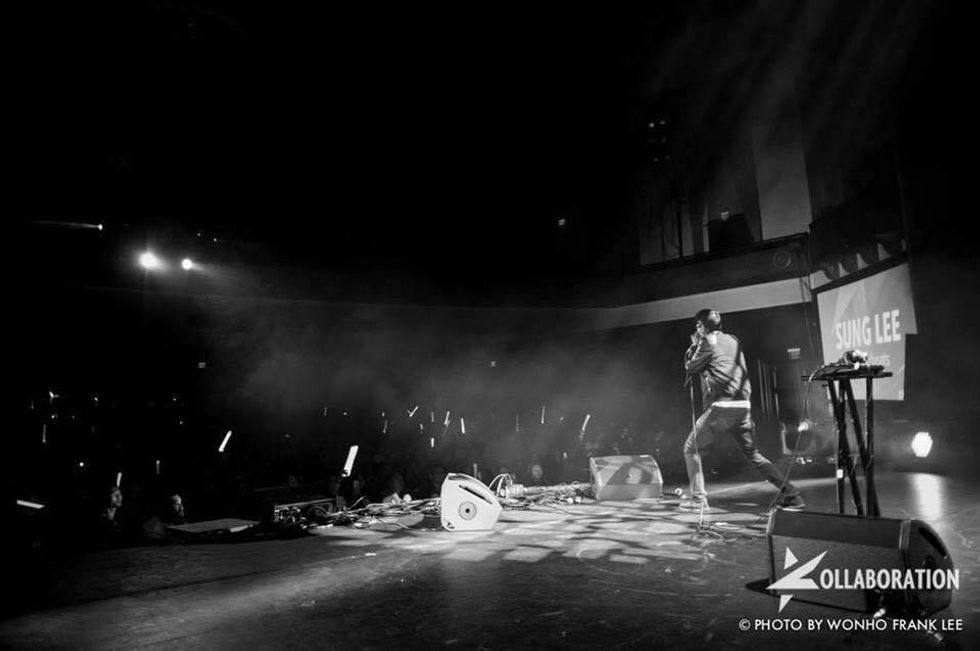
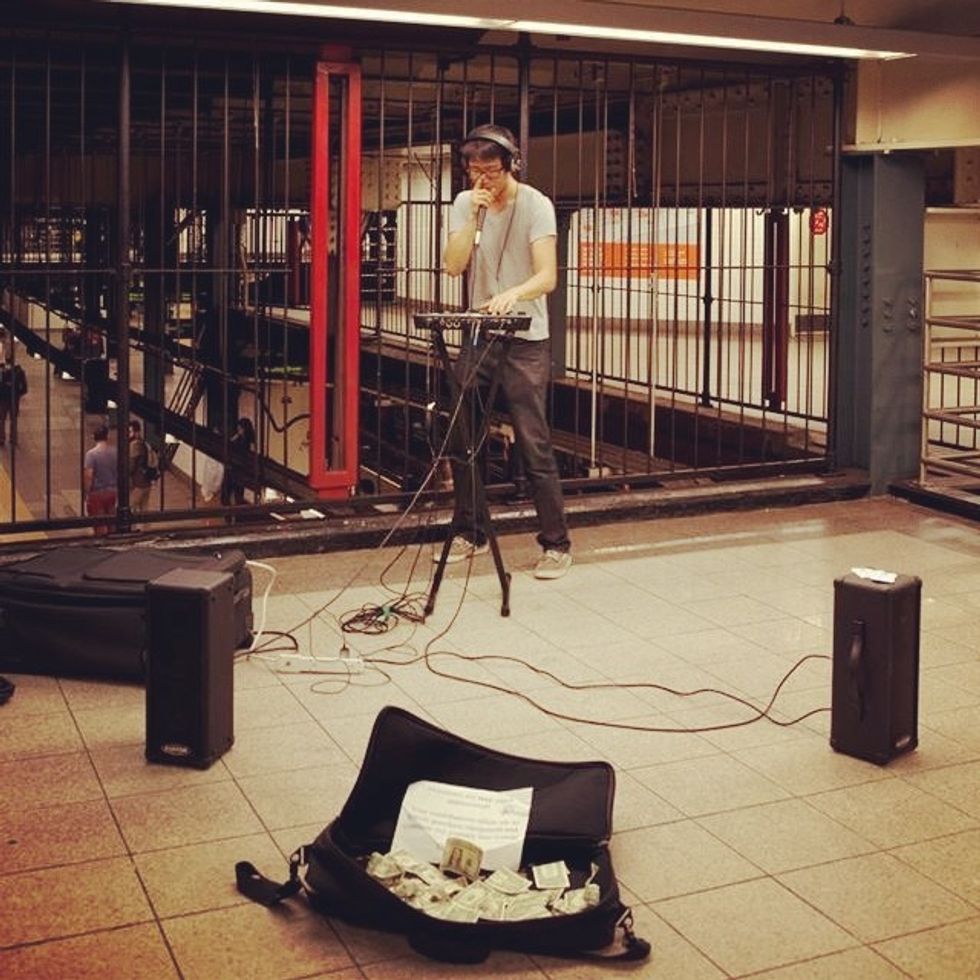

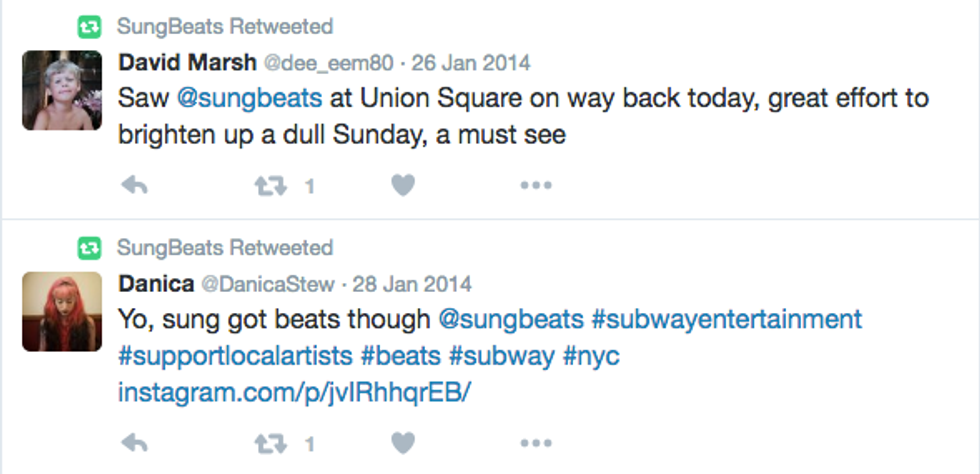
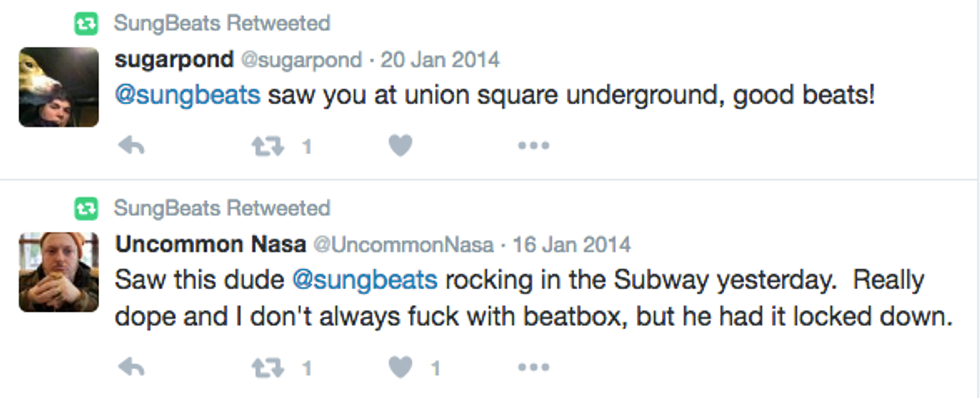
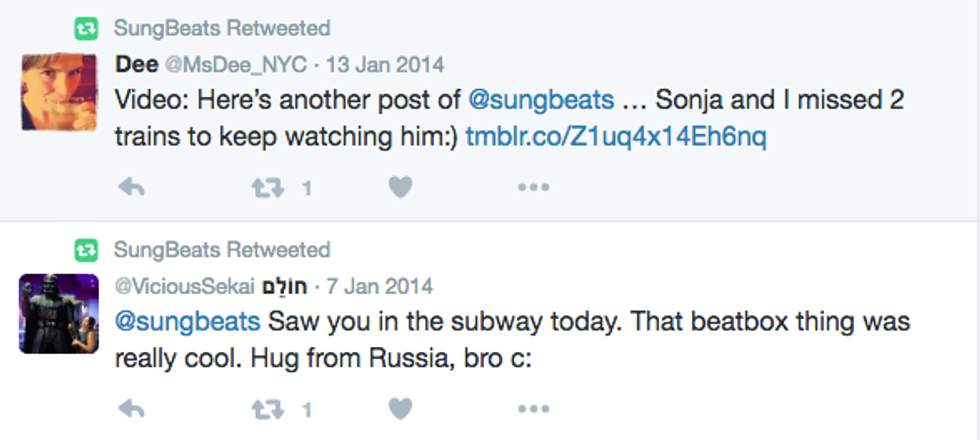

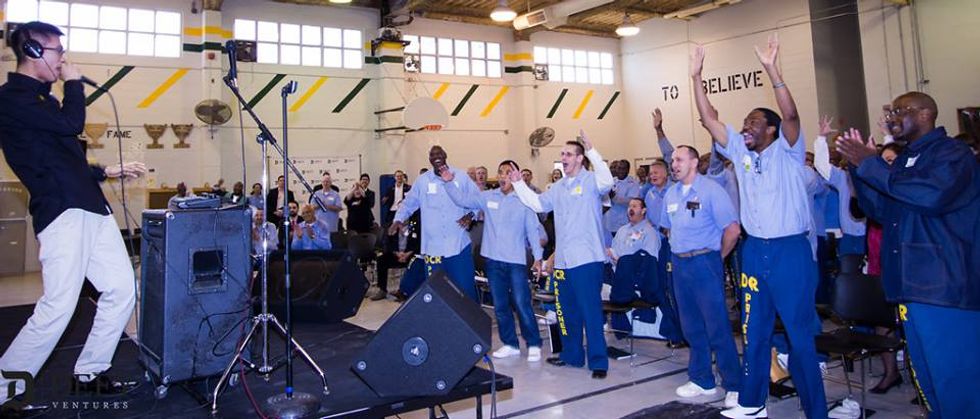


 Photo by
Photo by  Photo by
Photo by  Photo by
Photo by 



















